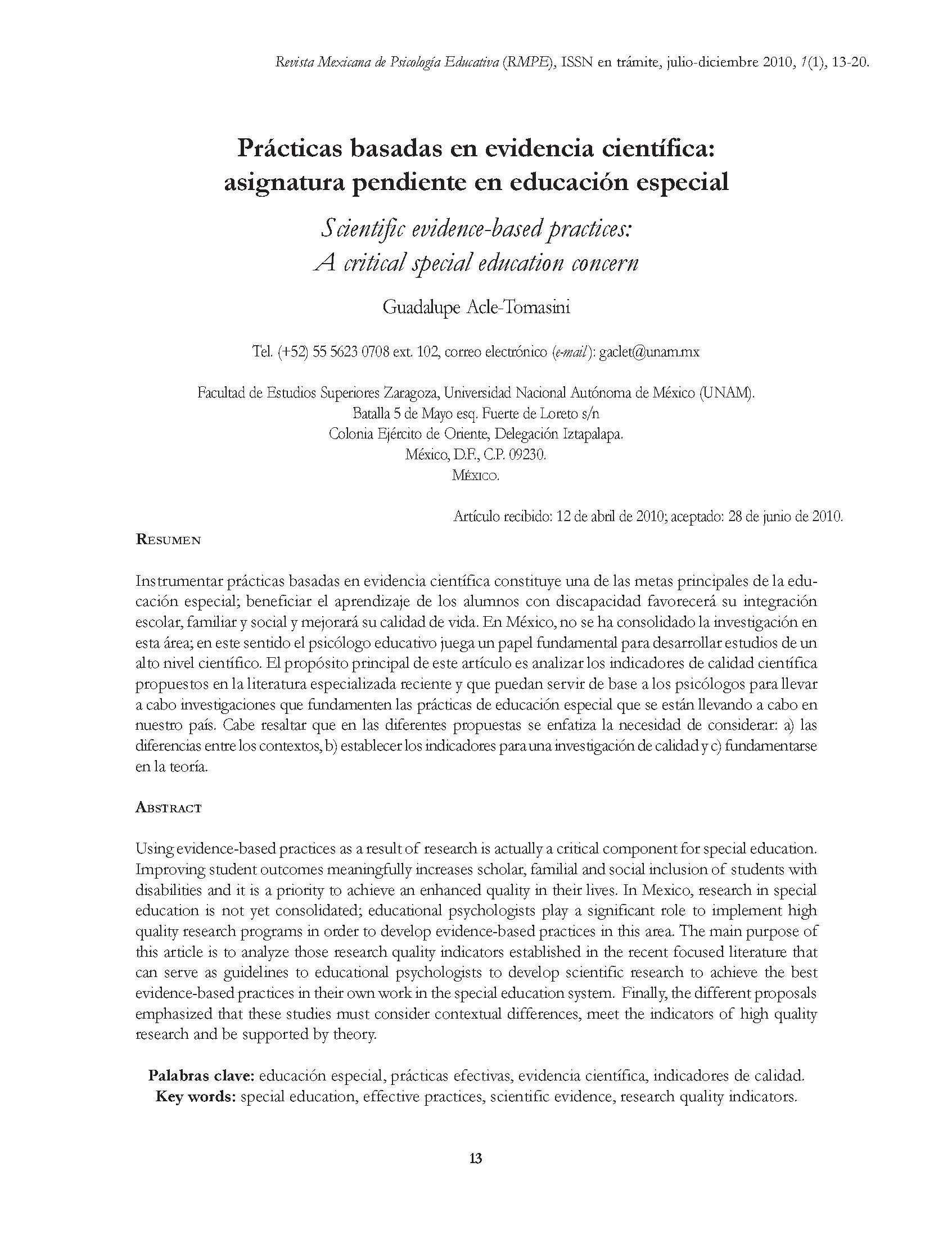Abstract
Using evidence-based practices as a result of research is actually a critical component for special education. Improving student outcomes meaningfully increases scholar, familial and social inclusion of students with disabilities and it is a priority to achieve an enhanced quality in their lives. In Mexico, research in special education is not yet consolidated; educational psychologists play a significant role to implement high quality research programs in order to develop evidence-based practices in this area. The main purpose of this article is to analyze those research quality indicators established in the recent focused literature that can serve as guidelines to educational psychologists to develop scientific research to achieve the best evidence-based practices in their own work in the special education system. Finally, the different proposals emphasized that these studies must consider contextual differences, meet the indicators of high quality research and be supported by theory.
References
Brantlinger, E., Jiménez, R., Klingner, J., Pugach, M. y Richardson, V. (2005). Qualitative studies in special education. Exceptional Children, 71(2), 149-164.
Cook, B. G. y Cook, L. (2008). Nonexperimental quanti- tative research and its role in guiding instruction. Intervention in School and Clinic. 44(2), 195-207.
Cook, B. G., Tankersley, M., Cook, L y Landrum, T. J. (2008). Evidence-based practices in special education: some practical considerations. Intervention in School and Clinic. 44(2), 69-75.
Cook, L., Cook, B. G., Landrum T. J. y Tankersley, M. (2008). Examining the role of group experimental research in establishing evidenced-based practices. Intervention in School and Clinic, 44(2), 76-82.
Fraser, M. W. y Galinsky, J. M. (2004). Risk and resilience in childhood: Toward an evidence-based model of practice. En M.W. Fraser (Ed). Risk and resilience in childhood. An ecological perspective. (pp. 385- 402). USA: NASW Press.
Fraser, M. W. (2004). The ecology of childhood: A multisystems perspective. En M. Fraser (Ed). Risk and resilience in childhood. An ecological perspective, (pp. 1-12). Washington. D.C. National Association of Social Workers Press.
Gersten, R., Fuchs, L., Compton, D., Coyne, M., Greenwood, Ch. y Innocenti M. S. (2005). Quality indicators for group experimental and quasi experi- mental research in special education. Exceptional Children, 71(2), 149-164.
Horner, R. H., Carr E. G., Halle, J., McGee, G., Odom,
S. y Wolery, M. (2005). The use of single-subject research to identify evidence-based practice in special education. Exceptional Children, 71(2), 163-179.
Instituto Nacional de Estadística y Geografía (2009). Anuario Estadístico de los Estados Unidos Mexicanos. México: Autor.
INEE (2007). La educación para poblaciones en contextos vulnerables. México: Autor.
Kohler, P. D. y Field, Sh. (2003). Transition-focused education: Foundation for the future. The Journal of Special Education, 37 (3), 174-183.
McDuffie, K. A. y Scruggs (2008). The contributions of qualitative research to discussions of evidence- based practice in special education. Intervention in School and Clinic, 44(2), 91-97.
Malandraki, G. A. y Okalidou, A. (2007). The application of PECS in a deaf children with autism: a case study. Focus on Autism and other Developmental Disabilities, 22(1) 23-32.
Morris, R. J. y Blatt, B. (1989). Educación especial. Investi- gaciones y tendencias. México: Médica Panamericana. Odom, S. L. y Wolery, M. (2003). A unified theory of practice in early intervention/early childhood special education.
The Journal of Special Education, 37(3), 164-173.
Odom, S. L., Brantlinger, E., Gersten, R., Horner, R. H., Thompson, B. y Harris, K. (2005). Research in special education: Scientific methods and evidence- based practices. Exceptional Children, 71(2), 137-148.
Roque, H. M. P. (2001). Metodología para la investigación en educación especial. ¿Cuantitativa o cualitativa? Enseñanza e Investigación en Psicología, 6(1), 117-136.
Sánchez, E. P., De Agüero, S. M., Jacobo, Z. y Rivera M. A. (2003). Estado del Conocimiento de la Investigación en Educación Especial en México (1990-2001). En P. Sánchez (Coord.) Aprendizaje y desarrollo (pp. 188-382). México: Consejo Mexicano de Investigación Educativa.
Sattler, J. M. (2003). Evaluación infantil: Aplicaciones cogni- tivas. Volumen 2. México: Manual Moderno.
Secretaría de Educación Pública (2009). Educación Espe- cial. Modelos de atención de los servicios de educación especial CAM y USAER. México: Autor.
Subsecretaría de Educación Básica. Dirección de Planea- ción e Innovación. Subdirección de Tecnología e Informática. (2009). Sistema de Estadística de Edu- cación Básica. http://sieeb.sep.gob.mx
Tankersley, M., Harjusola-Webb, S. y Landrum, T. J. (2008). Using single-subject research to establish the evidence base special education. Intervention in School and Clinic, 44(2), 83-90.
Thompson, B., Diamond, K. E., McWilliam, R., Snyder,
P. y Snyder S. W. (2005). Evaluating the quality of evidence from correlational research for evidence- based practice. Exceptional Children, 71(2), 181-194. Vaughn, S. y Linan-Thompson, S. (2003). What is special about special education for students with learning disabilities? The Journal of Special Education, 37(3), 140-147. Widmon, M. E., Skinner, C. H., Watson, T. S. y Garrett,
L. S. (2004). Enhancing assignment perceptions in students with mathematics learning disabilities by including more work: An extension of interpersonal research. School Psychology Quaterly, 19(2), 106-120. World Health Organization (2000). International classification of functioning, disability and health. Dispo
nible en: http//www.who.int

This work is licensed under a Creative Commons Attribution-NonCommercial-NoDerivatives 4.0 International License.
Copyright (c) 2024 Universidad Nacional Autónoma de México


